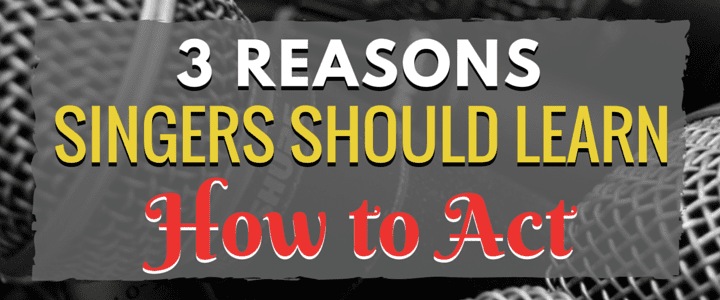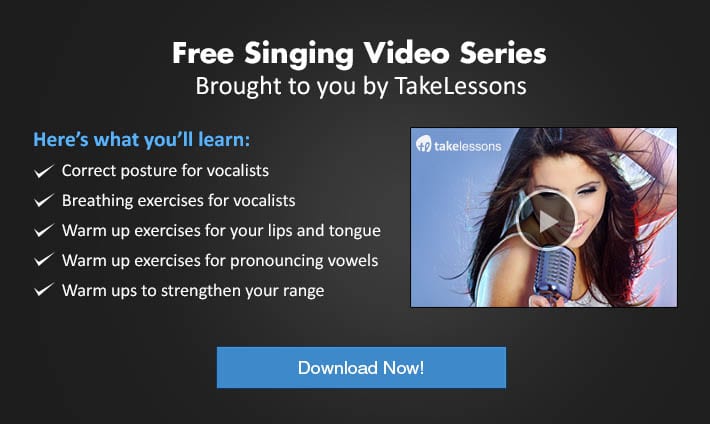 Great stage presence can really enhance your performance as a singer! Here, voice teacher Molly R. shares how learning how to act should be on every singer’s to-do list…
Great stage presence can really enhance your performance as a singer! Here, voice teacher Molly R. shares how learning how to act should be on every singer’s to-do list…
Enviable high notes. A pure tone. Easy vocal runs. Low notes that can carry for days. Flexibility throughout the range. These are just some of the things singers say they want to achieve when they first start voice lessons — among many, many other goals!
As a voice teacher, I do my best to work with them so that they find success in making their voice feel and sound great — but to me, there’s something many singers are missing in their “wish list” to become a better singer: how to really sell your song as a singing actor!
Here are the reasons why it’s so important that a singer also learns how to act.
1) It’s good for your body!
When we stand still, our sound will also be stiff and still. Experiment time: think about something that gets you riled up or giddy with happiness. What does your body do? It moves. It paces, it gestures. It expresses. Nothing is left bottled up.
When we move, the breath and the voice move — simple as that. As a result, the audience gets a more exciting sound, and that’s a very good thing. It’s also a big part of stage presence for singers. We were meant to move and express, not just stand there. That’s not natural! Although, that’s not to say that you shouldn’t practice good singing posture as well.
2) It makes you a true standout.
There are lots of great voices out there, and competition is stiff. What can set you apart from the crowd is if your audition panel or audience really feels a true connection with you! And the only way to get that connection is if you make absolutely sure that you know exactly what you’re singing about.
So don’t treat your songs as mere lyrics — do what the great artists do, and treat each one as a mini play or movie. Create a backstory for your character. Put other characters in your song and visualize them. The more layers you add to your performance, the more compelling it will be. Once you add layers, you’ll be creating a unique and authentic stage presence.
Once in a while we’ll have a challenging song where we say to ourselves, “But I can’t relate to that! I’ve never had my heart broken/been cheated on/had someone I love die/been in love/etc.”
In cases like these, it’s time for you to use your imagination. So maybe you never had a lost love — but everyone’s experienced some sort of sadness! Channel that. Simply sing about about something else you have lost to really bring the authentic emotion to the song.
3) It increases your job prospects!
If you start by learning how to really act your pop or jazz songs, after a while you may feel ready to audition for musical theatre roles, if that interests you! Who knows? After doing some musical theatre and getting some stage time under your belt, you may want to try straight plays!
Singing actors are also meant for the cabaret stage. In these intimate venues, performers string together an eclectic group of songs to tell a story. If you study acting, you’ll feel a lot more at ease about your performance and find it easier to add in the “banter” in between songs that’s essential in this type of performance.
Stage Presence for Singers
There’s no need to feel intimidated by the world of acting if you’re completely new to it. There are many qualified voice teachers and acting teachers on TakeLessons to help you get started! Whether you want to improve your singing or get started with acting, you’re sure to find the right instructor for you.
Additional Resources
Looking for more help? Here are some articles and videos we like:
- How to Improve Your Stage Presence via YouTube
- Stage Performance Tips for Singers via Open Mic UK
- 4 Tips on How to Have And Improve Stage Presence via Music Industry How To
Singers, have you taken acting lessons? Did it help you with your stage presence? Let us know about your experience in the comments!
 Post Author: Molly R.
Post Author: Molly R.Molly R. teaches online and in-person singing lessons in Hayward, CA. Her specialties include teaching beginner vocalists, shy singers, children, teens, lapsed singers, and older beginners. She joined TakeLessons in November 2013. Learn more about Molly here!
Suzy S.

